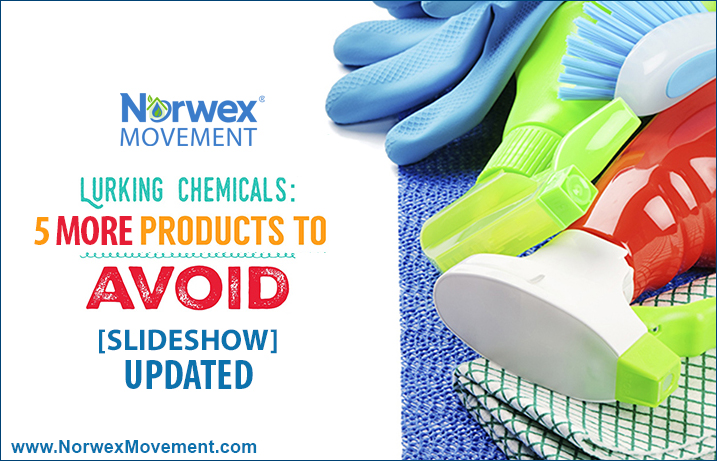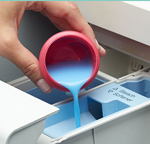

You want your home to be a clean, safe haven for your loved ones, but you may not realize that you could be bringing (or have already brought) some pretty toxic stuff into your house.
As I mentioned in this January 2016 blog, the air inside your home can be two to five times more polluted than the outdoor air! And with the amount of time your family spends indoors, it’s a good idea to keep products that are filled with harmful chemicals out of your home altogether.
Here are a few more commonly used products that you should avoid bringing into your home in order to keep your family healthy and safe.

5. Nonstick Pans
When I use a frying pan, the last thing I want to do is worry about food getting stuck to the pan while I cook. But it turns out that using a nonstick pan, while more convenient, can be harmful to human (and even animal) health!
Most nonstick pans are coated with Teflon, which prevents food from sticking, but according to the Environmental Working Group (EWG), when nonstick cookware is heated to higher temperatures, the Teflon coating can break apart, releasing toxic particles and gases.
These toxic fumes have been known to cause flu-like symptoms (referred to as “Teflon Flu”) in humans and even kill pet birds. Teflon itself comes from a group of chemicals known as perfluorinated chemicals (PFCs), which have been associated with high cholesterol, weakened immune systems and hormone disruption.
Make sure to avoid using nonstick cookware and if possible, try finding a more eco-friendly alternative such as stainless steel, cast iron or even ceramic pans. If you must use nonstick cookware, be sure to use it properly and don’t pre-heat or overheat your pan while cooking.

6. Pesticides
When pests invade your home, your first response might be to grab some bug spray and go on the offensive. Pesticides, however, are extremely toxic not only to insects and other critters, but to humans as well!
Exposure to pesticides has been linked to health issues such as skin irritation, nausea, headaches and more. And one report from CNN cites a study published by the American Academy of Pediatrics, which revealed that children who had been exposed to insecticides indoors were 47 percent more likely to have leukemia and 43 percent more likely to have lymphoma.
Ditch the pesticides and keep your family safe and healthy! If you’re concerned about bugs in and around your home, try sealing cracks where they may enter, or check out my blog that offers eco-friendly tips for chemical-free pest control.

7. Perfume
Sometimes the scent of perfume is like a breath of fresh air, but unfortunately, the chemicals found in many perfumes are often hazardous to your health.
Although some perfumes (and colognes) may contain some natural ingredients, they also usually include many synthetic fragrance chemicals that are untested for human safety. According to EWG, the fragrance in perfume may be composed of any number of the fragrance industry’s 3,100 stock chemical ingredients—ingredients that are often kept hidden from consumers!
And Scientific American magazine reports that many perfumes contain chemicals which accumulate in human tissue and have been linked to everything from allergic reactions to hormone disruption.
To help avoid health issues like these while still smelling great, try some natural alternatives such as essential oils or click here for a list of organic perfumes that are free of harmful chemicals.

8. Scented Cleaning Products
Like air fresheners and perfumes, even cleaning products are sometimes scented to make a home smell “fresh.”
But as much as you love the smell of your laundry detergent, fabric softener or all-purpose cleaner, they may be filled with synthetic fragrance chemicals that can cause headaches, allergic reactions, respiratory irritation and hormone disruption.
To help protect your family and the environment, stay away from fragrance chemical-laden cleaning products and replace them with a high-quality microfiber cloth, some water and a little elbow grease! Your house may not smell like a tropical beach or a pumpkin pie baking in the oven afterwards, but sometimes a clean home is one that’s free of scent, not one filled with toxic “good-smelling” chemicals.
And if you are looking for a more natural way to fragrance your home, try fresh-cut flowers, essential oils or one of the do-it-yourself natural fragrance recipes you can find online.

9. Typical Fabric Softeners, Dryer Sheets and Wrinkle Release Sprays
Did you know that synthetic dyes and fragrances as well as a wide array of parabens are all common ingredients in most typical fabric softeners, dryer sheets and wrinkle release sprays?
It’s true! And by using products like these to soften fabric and give garments a fresh clean scent, you could be coating your family members in chemicals every time they change clothes!
To help ensure that you’re not inadvertently adding harmful chemicals to the mix at laundry time, avoid scented dryer sheets, fabric softeners and wrinkle release sprays.
Use wool dryer balls instead. They soften clothing naturally, help reduce drying time as well as wrinkles, and may even help reduce static. In addition, you’ll also cut down on buildup in your lint catcher caused from softeners and dryer sheets, which could burn out the heating element.
Resources:
Treehugger: 8 things to never bring into your home
EWG: Skip the non-stick to avoid the dangers of Teflon
NRDC: 9 Ways to Avoid Hormone-Disrupting Chemicals
CNN: Pesticide exposure linked to childhood cancer and lower IQ
AAP Gateway: Residential Exposure to Pesticide During Childhood and Childhood Cancers: A Meta-Analysis
Movement Blog: Chemical-Free Summer: Home Pests
Scientific American: Scent of Danger: Are There Toxic Ingredients in Perfumes and Colognes?
Treehugger: 12 companies that make luxurious all-natural perfumes
Envivia Clean: What Does Clean Smell Like?
EWG: Not So Sexy
Movement Blog: Dryer Sheets, Softeners and Sprays! Oh My!

National Bike to Work Day is May 20!
In support of our mission of reducing chemicals and plastics in the environment, Norwex Movement wishes you a happy National Bike to Work Day!
I need to remove a couple of pans from my kitchen!
I just have to say, I love seeing the voting results….100% avoid those chemicals!! Yippee!!
Costco has a great stainless steel set of pans that we love- If you have any ideas about what to use to fry eggs, though, I’d be thankful!
Thanks for your comment, Kate. And great question! According to The Eco Friendly Family, your stainless steel pans should be fine for frying eggs. Just be sure to use a good oil too.
Like coconut oil is the best cuz it can go to high temperatures and of course olive oil or probably any other nut oil
I learned how to fry eggs from America’s Test kitchen and it works perfect every time. You preheat the pan at a medium temp, then add half olive oil and half butter, not sure on amounts, probably a couple of tablespoons. Let oil start to smoke then add eggs, but have eggs cracked in advance, 4 for a large pan. As soon as you add the eggs, put a lid on the pan and timer on 1 min. Then take pan off heat and let sit in pan with lid still on for another min or so, until you see the whites go from clear to white. They slide right out of the pan and are perfectly cooked white with a soft yellow. I’ve NEVER had them stick to my stainless steel pan using this method!
Thanks for the advice I’m going to have to try this 🙂
A little olive oil wiped around on the bottom of my stainless steel frying pan and eggs don’t stick.
I have avoided Teflon for some time, but recently received an expensive Calphalon skillet that is supposed to be safe. I love the way it cleans, but wonder—is it a safer product?
I have Calphalon stainless steel pans and love them! there is nothing I can’t make in them and everything comes out of the pan well and they clean like a dream.
I have All Clad stainless steel cookware two that are some type of non stick coating. I’m hoping they are not damaging to our health! I’ll now have to look into it.
I had completely forgotten about the Teflon! Looks like I need to go through the cupboard!
I had no idea that Teflon was harmful. Thanks for the tips, i’ll be cleaning out my cupboards and removing all non stick Teflon pans!
We are working to replace all of our nonstick pans with stainless steel. I do as much cooking as I can in my cast iron pan, and I love that it has the added benefit of adding extra iron into my family’s diet!
What kind of pan do you all use when making pancakes or French toast?
I always use cast iron and enameled pans. I don’t own any teflon coated. I was always concerned it it flaking off and then consuming it when it mixed with our food. thanks goodness I use the old fashioned ways of my grandparents!
I do everything on this list except the pans. I need to work on getting rid of the non stick pans.
Switching to ceramic cookware was my FIRST EVER intentional act in moving my home to a chemical free environment!
I had no idea non stick pans were so bad ! You learn something everyday
I’ve removed all the aluminum cookware and only buy baking powder without aluminum in it. There is a link between ingesting, absorbing aluminum and Alzheimer’s; a huge issue in my family.